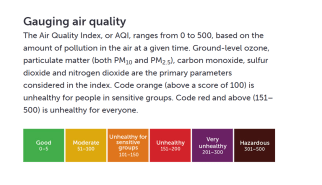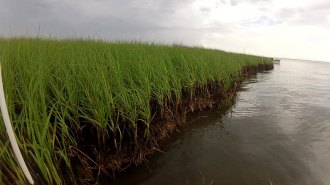Search Results
Planning a Garden Plot
Gardens have many functions ranging from vegetable and fruit production to flood mitigation and erosion control. Gardens also can be a haven for pollinators and a repository for native plants. Over the course of a year, students will design a garden for their school or a community organization using scientific concepts they learn in class.
Syncing the power grid to renewable energy
How is the U.S. doing in its transition away from coal-fired power plants to renewable energy sources? Analyze state and national data to learn about the transition and one of the major challenges: keeping the grid stable as large power plants shut down.

Health Effects of Climate Extremes and Thermal Technology
Climate extremes are impacting human health and inspiring new technology. This guide provides lesson plans paired to recent news articles covering a new thermal fabric prototype and its ability to regulate temperature and how wildfire smoke impacts the air quality index and human health.
Keep up with your air quality
Air pollution and wildfire smoke are affecting many areas of the country. Check your air quality index and learn how poor air quality could impact your health with this quick activity!
How Erosion Alters the Landscape
When wind and water move, they don’t move alone — they take parts of the land with them. In this activity, students will investigate how water carries sediments from one location to another via erosion and will explore how this natural process can alter the landscape.

Climate Change Spikes Baseball Homers
Baseball fans love numbers and explaining every nuance of baseball statistics. In this Guide, students will learn how climate change is boosting home runs and study the physics behind the increase in homers.
How heat and home runs are connected
Students will answer questions about the online Science News article “Baseball’s home run boom is due, in part, to climate change,” which explores how increases in temperatures boost home run numbers. A version of the article, “Climate change spikes baseball homers,” appears in the May 6, 2023 & May 20, 2023 print issue of Science News.
Cultural Connections for Species at Risk
In the face of habitat loss and pollution, more species around the world are threatened by extinction. But how should conservation resources be allocated? In this activity, students will debate whether the allocation of conservation resources should consider the cultural significance of a species.

Shores Still Reeling from 2010 Oil Spill
Soil erosion happens naturally and through human actions. In this activity, students will explore how an oil spill changed Louisiana’s coastline, and they will look for examples of landscape features that were created by erosion and examples of human-caused erosion in their area.
Cascading effects of erosion
Students will discuss a disastrous event that led to erosion and use the event to contextualize the impact of erosion on humans and the ways humans increase and decrease erosion.
Learning Outcomes: Determining examples of erosion and its positive and negative impacts on humans and analyzing an example of a human-induced ecosystem disruption and understanding how it caused erosion in the ecosystem over time.
Why soils in marshes matter
Students will answer questions about the online Science News article “The Deepwater Horizon oil spill ruined long-term shore stability,” which explains how damage to plants and soils is causing coastal marshes to retreat in parts of Louisiana. A version of the article, “Shores still reeling from 2010 oil spill,” appears in the March 25, 2023 issue of Science News.
Curbing Climate Change
The emissions of greenhouse gases through human activities are changing the world and making it warmer. But there are technologies and strategies that can reduce these emissions and slow climate change. In this activity, students will research methods of reducing carbon dioxide production and removing carbon from the atmosphere and present on their findings.